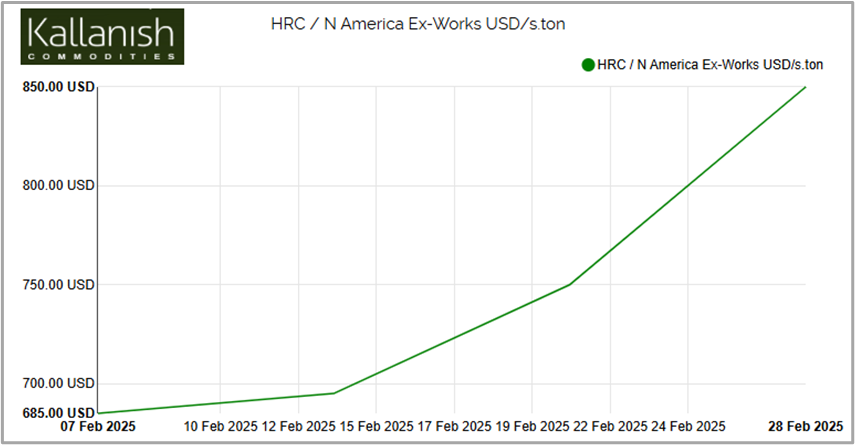The
impact of globalisation and geopolitical tensions on the steel industry are set
to be more pronounced than ever in the year ahead. President Trump’s decision
to impose substantial steel tariffs on nearly all nations has far-reaching
consequences, which will only intensify as other countries introduce similar retaliatory
measures. The inevitable outcome of this scenario is a resurgence of inflation
and rising steel prices.
Here
in the UK, liquid steel output has currently reduced to circa 3 million tonnes
per annum, while consumption stands at approximately 12 million
tonnes—highlighting the country’s heavy reliance on imports.
At
All Steels, our primary focus is on long products, and so the main focus of this
note aims to provide our customers with an insight into expected price
developments for structural sections, merchant bars, and hollow sections.
Notably, 86.16% of UK imports for these products come from the EU and Turkey.
The anticipated market shifts are already taking shape and could escalate rapidly.
Already
in the UK we have recently seen £20-30 per tonne of price increases applied by
most European producers of long products but it is All Steels’ view that this
is only the first wave of such hikes. Our concerns and observations are initially
focused on ferrous scrap as this is where the impact of Trump’s tariffs are
most noticeable.
In
the US, protectionist measures have already enabled domestic producers to raise
steel prices on certain products by $165 per tonne during February 25
and the US scrap producers are wasting no time in taking a slice of this
increase as well as enjoying the uptick in local demand. The graph below, featuring
Kallanish published data on North American Hot Rolled Coil Mill Ex-Works Prices
in US dollars, serves as a strong indicator of price trends.
 Trade
flows are already shifting in response to this situation, with Turkey being the
hardest-hit country due to its status as the world's largest buyer of American
scrap. In 2024, the US exported 13.38 million metric tonnes of scrap, with
Turkey accounting for a significant 4.41 million metric tonnes.
Trade
flows are already shifting in response to this situation, with Turkey being the
hardest-hit country due to its status as the world's largest buyer of American
scrap. In 2024, the US exported 13.38 million metric tonnes of scrap, with
Turkey accounting for a significant 4.41 million metric tonnes.
As
a result, Turkish steel producers are left with two main options:
1: Pay a premium for US scrap, which is expected
to rise in line with increasing US domestic prices—a trend that is already
evident.
2: Source raw materials from alternative markets,
and increased buying activity from Europe is already evident.
The
latter scenario is already tightening scrap availability in Europe and as this
supply and demand balance switches prices are naturally increasing.
Over
the coming months it is also likely that we will witness cuts in both UK and EU
Safeguard quotas, dramatically heightening the risk of 25% import duties,
especially on merchant bars (including angles) and structural sections. We also
have the introduction of CBAM (Carbon Boarder Adjustment Measure) on the
tailwinds, which as a standalone event will create one of the biggest upshifts
in UK steel prices.
The
All Steels strong message to all our customers is therefore to increase
awareness of rising prices over the months ahead and as of this morning we will
be applying a £20-30p/t price increase across most of our stock items. What is
also important to note is that we are starting this journey from a very low
stock base throughout the supply chain so demand is likely to jump quite
quickly as buyers make their moves to beat price increases. Here in the UK, we
are also of the belief that government infrastructure spending is truly ready
to begin so this will also fuel much needed improvements in demand.
It
has been a long-drawn-out trough of weak steel demand and prices but All Steels
firmly believes that we are at that turning point where we all need to be
prepared for price escalation that now looks unavoidable.